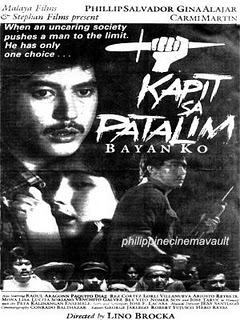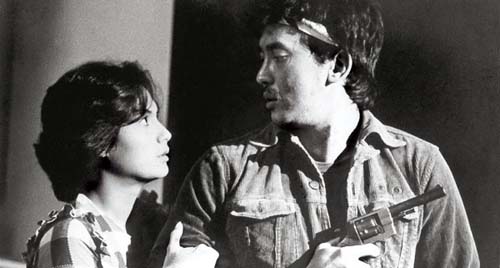
As Rizal famously said, you cannot get to where you're going without looking back at where you came from. But what if where you came from is where you still are? This is the thought that entered my mind yesterday at the opening of The Filipino Screen at Market! Market! The festival, organized by the Ayala Malls in cooperation with the Filipinas Heritage Library is a showcase of six auteurs who were at the forefront of vanguard filmmaking during the Marcos era. The festival is inspired by Eddie Romero's definitive piece on history, nation and identity "Ganito Kami Noon Paano Kayo Ngayon?" and poses the question by creating a contemporary setting where the work can be appreciated. The films are to be shown in all Ayala Malls in Metro Manila, Pampanga, and Cebu. Yesterday's features were Bayan Ko: Kapit sa Patalim by Lino Brocka and Sister Stella L by Mike de Leon. The first film by Brocka was scheduled for 11 am, but was shown at half past eleven due to a very low audience turnout. To be specific, at eleven am, only two people had bought tickets (including myself). It was after all a weekday, and most people in line were buying tickets for Sex and the City. It must have been hard to sell something called Bayan Ko: Kapit sa Patalim compared to Sex and the City, but eventually, around twenty people were in the theater waiting for the show to begin. This is not very different from when it first came out. After the screening, an informal dialogue with actress Gina Alajar, scriptwriter Pete Lacaba, filmmaker Kiri Dalena and artist Yason Banal took place. Lacaba shared how it was very difficult to get the film shown in the country, despite the paper lifting of martial law. To get the film shown in Cannes, they had to smuggle it out. Alajar admitted that the entire time she was watching, she was thinking about how differently she would treat the role now that she is "no longer naive."

Victims. Luz (Gina Alajar) and Turing (Philip Salvador) were driven into a life of crime because of poverty.
Naive or not, Alajar's performance as Luz was powerful - as the entire film was. Shot simply, sans the fancy techniques and editing magic, Brocka's film captured life as it was. Of course, this was greatly due to the fact that Lacaba wrote the screenplay based on actual events, whether personal or from newspapers at the time. Slightly disturbing was the fact that while watching, I got the odd sense that I was watching something current. Sure, the hair was weird, the clothes the kind you can see in sepia photos of your parents when they were still cute (and a lot skinnier), but the events were the same. The live footage of rallies which Brocka used looked pretty much the same as the ones today, asking for higher wages and better working conditions for the laborers. The issues the same, the script still very much applicable. I left the theater feeling depressed, but at the same time, inspired. Annoyed by the fact that most people would rather watch girls in New York than these local classics, and hoping that writing about it would increase the chances of getting more people to get tickets to the other screenings. After all, it's only 65 pesos. Tomorrow is the last day at Market! Market! featuring Perfumed Nightmare by Kidlat Tahimik (June 10, 11am), and Ganito Kami Noon, Paano Kayo Ngayon? by Eddie Romero (June 10, 1pm). For group reservations, please call Filipinas Heritage Library at 892-1801, email
karaan.mi@ayalafoundation.org or send an SMS to 0917-5612413. Visit
www.filipinaslibrary.org for the screening schedule in Glorietta, Marquee Mall, and Ayala Center Cebu.
- GMANews.TV 




